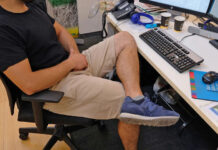Heatstroke is predictable and preventable. Doctors suggest following precautionary measures to avoid heat stress.
During the holy month of Ramadan people needed to ensure they rehydrate thoroughly following Iftar every day. Dehydration is one of the key symptoms of heat exhaustion.
Avoid coffee or tea and drink more water. Coffee can be dehydrating while water replaces fluids lost from sweating. Avoid rapid exposure to temperature extremes.
Allow your body to adjust naturally by incremental exposure to extreme temperature versus heating up and cooling down and then repeating this process.
Wear light clothing that allows your body to cool itself using natural evaporative cooling produced from sweat and circulated air.
Wear a hat or head covering. Wear sunscreen. When you are active outdoors for long periods, sunscreen needs to be applied regularly. Symptoms of heat stress include excessive sweating or no sweating at all, nausea, goose bumps, tightening muscles, or dizziness.
Take a rest period in a cooling station to reduce core body temperature and refresh yourself before continuing with your activities. Excessive sweating can be a sign of heat stress.
The key to preventing heat stress is to take the time to plan ahead when you know you or those you care about will be outdoors for extended periods.





